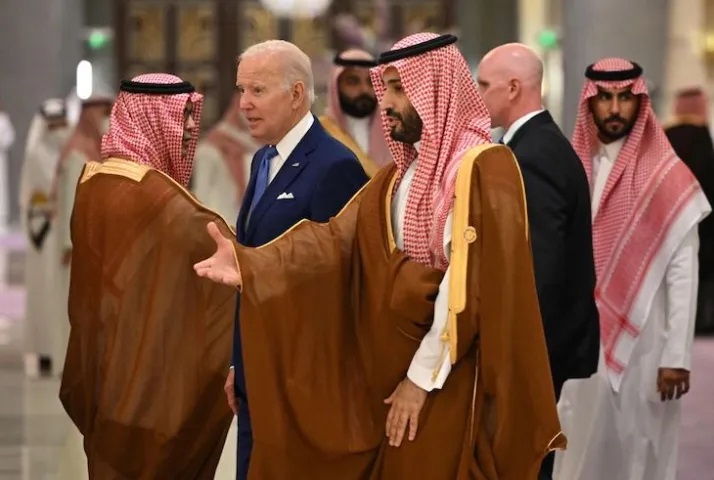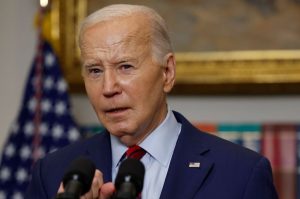Very rarely do American presidents get policy wins in the Middle East. The region hasn’t been kind to the United States over the last thirty years. The signing of the Israel-Egypt peace treaty during the Jimmy Carter years and the US-led military campaign against Saddam Hussein’s Iraq during the 1991 Gulf War are two exceptions to the rule. Everything else has been a failure of degree. Others, like the invasion of Iraq in 2003 and the Trump administration’s arbitrary withdrawal from the Iranian nuclear deal in 2018, were self-inflicted wounds that made the region bloodier and more difficult to manage.
True to tradition, the Biden administration doesn’t have much foreign policy success in the Middle East either. Part of this is because Biden sought to talk down the region in US grand strategy, a worthy goal given the limited US interests there. But another part is the sheer difficulty of achieving a major diplomatic success in this area of the world. Whenever the US tries to get one going, whether it was the Oslo Process during the 1990s or the back-channel diplomacy to end Yemen’s decade-long civil war in the 2020s, the efforts have usually stalled.
Netanyahu remains obsessed with taking Rafah
Biden, however, has been spending the last year trying to accomplish something remarkable: establishing normal diplomatic relations between Saudi Arabia and Israel, a feat that would surpass the Trump administration’s Abraham Accords in terms of historical significance. The White House has expended a ton of diplomatic capital in pursuit of it and is so desperate for a win that it’s prepared to offer Saudi Crown Prince Mohammed bin Salman two big US concessions along the way: a stronger US defense commitment to Saudi Arabia and assistance with Riyadh’s nuclear energy program.
Yet October 7 changed the game, not only due to the depravity of Hamas’s assault and Israel’s still unfolding, six-month offensive in Gaza but also because Saudi Arabia is now demanding far more on the Palestinian file today than they did last year. An Israel-Saudi normalization agreement sounds simple in theory: the two countries, who have already worked together under the table for years, would sign a document, open up their embassies and exchange their ambassadors. But that would be an overly simplistic interpretation of how this entire process would work. In reality, an Israel-Saudi deal is really an Israel-Saudi-US-Palestinian deal that requires concessions from everybody. It’s in essence a complicated jigsaw puzzle where all the pieces have to fit perfectly into place.
The Saudis long ago sensed Biden’s desperation for a deal and have laid out a substantial price for their cooperation. While Washington is highly unlikely to grant Saudi Arabia the same US security protections as a NATO ally, Biden is willing to codify some kind of US commitment in the form of a treaty. You can bet that Biden’s earlier suspension of offensive weapons to Riyadh over the war in Yemen would be rescinded, paving the way for the US to sell fighter aircraft and a whole bunch of munitions to the same Royal Saudi Air Force that once bombed houses, homes and school buses in its southern neighbor. The Saudi nuclear program would be afforded the opportunity to operate on US-nuclear technology (although the technology itself would be strongly monitored), causing nonproliferation hawks in Washington and Europe to lose their minds. For Biden, all of this is apparently a price worth paying for getting into the history books as a Middle East peacemaker.
The problem from the US perspective is that everybody around the table needs to come away happy. Good luck with that.
The Saudis have made it clear that normalization with Israel can only occur if the Palestinians are finally given a state of their own. Before October 7, the al-Saud family might have been willing to live with a few token Israeli concessions to the Palestinian Authority (PA), such as more West Bank territory under Palestinian control or a written Israeli assurance that negotiations toward the formation of a Palestinian state was official Israeli policy.
But this is no longer the case. The fact that nearly tens of thousands of Palestinians (and counting) have been killed in Israel’s air, land and sea invasion of Gaza over the past six months means Saudi Arabia, the most powerful and influential member of the Arab world, can’t be depicted as giving Israeli prime minister Benjamin Netanyahu a political lifeline. A mere process toward Palestinian statehood is far below what the Saudis will now accept.
“The Kingdom has communicated its firm position to the US administration that there will be no diplomatic relations with Israel unless an independent Palestinian state is recognized on the 1967 borders with East Jerusalem as its capital,” the Saudi foreign ministry wrote in a statement back in February. In addition, the Saudis are demanding that Israel end the war in Gaza and pull out of the enclave.
Needless to say, Netanyahu isn’t inclined to do any of this. Months of truce talks with Hamas remain in limbo, with the Palestinian terrorist group using the rest of the hostages in its custody to compel an Israeli withdrawal. Netanyahu remains obsessed with taking Rafah, the last city under Hamas’s control but one that is also teeming with more than a million Palestinian refugees (the Biden administration has spent weeks strategising with Israel on the best way forward). And more importantly than any of that, Netanyahu and the ultranationalist ministers in the cabinet are dead set against a Palestinian state —!a position backed up by the Israeli public, where nearly 60 percent oppose it according to a February poll by the Israel Democracy Institute.
At this stage, the chance of reaching a mega-deal is slightly better than the Chargers winning the Super Bowl. Which begs the question: does Biden know something we don’t or is he content with grasping for straws?
This article was originally published on The Spectator’s UK website.


















